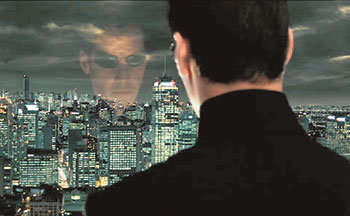Matrix Syndrome Why Are We So Crazy About it?
Matrix Syndrome Why Are We So Crazy About it?
Posted May. 30, 2003 22:06,

Are we indeed living in the Matrix?
Edited by Glenn Yeffeth, translated by Lee Su-young and Min Byung-jik
349 pages, 12,000 won, published by Good Morning Media
The Matrix, a virtual world created by artificial intelligence, has become a major cultural phenomenon that penetrates today`s digital age, instead of being merely a hit Hollywood movie.
The movie first hit theaters four years ago, and now the sequel `Matrix 2: Reloaded` is again sweeping throughout the country, luring 1.7 million movie-goers in 8 days since the launch. People do not ask `Did you see it?` Instead, they talked about how many times they have seen it.
When it was released in 1999, it not only pleased eyes of the audience with cutting-edge digital graphic technology, but also hit people hard with an assumption that the world we are living in can be fake, a virtual reality. This is why so many people are still crazy about the movie.
It deals with the core issue of human existence in the modern world where humans co-exist with science and technology. It also epitomizes the questions human have asked to themselves facts vs. perception, reality vs. virtual reality, freedom vs. control, divinity vs. humanity, material values vs. universal values etc
In this book, 14 philosophers, economists, literature, religion scholars, SF writers and computer programmers analyze the so-called Matrix syndrome from many different perspectives and diagnose problems in the modern-day society.
▽Reed Mersher Shucherd (Professor of Media Criticism at Manhattan University)
`The Matrix` is a study on human consciousness masked as an action movie. The Matrix in the movie is the world we are living in now. What is noteworthy is that the Matrix begins to form when machines realize humans are the virus that destructs the ecological balance.
▽Ryle Ginder (Professor of philosophy and cognitive science at Indiana University)
People living in the Matrix see combinations of sense data provided by the Matrix as the reality, but people living outside it perceive the reality that exists in real. `The Matrix` is a move based on externalism. From idealism`s perspective, humans perceive information their sensory organs receive. Therefore, humans cannot know whether the reality exists in real.
∇James Ford (Professor at Wake Forest University Religious Studies)
The part that the world of Matrix is not a reality but a fictional world which looks like a reality can be compared to metempsychosis. In other words, this is a life of a worldly human who is indulged in ambition and attachment believing oneself, belief and phenomena are eternal.
One must be awaken from Matrix by reprogramming oneself through training just like the main character Neo.
∇Peter Betky (Professor at George Mason University Economics)
In the Matrix, Morpheus offers Neo a blue pill and a red pill, asking him to choose between an already programmed abundant life and a harsh subjective life of reality. This is similar to making a choice between a system that guarantees manual safety and a system that guarantees individual freedom.
∇Bill Joy (Representative and Chief Researcher at Sun Microsystems)
Computers will be powerful enough to change the world using the combination of physics and genetics by year 2030. Whether it would be a machine, a genetically engineered creature or even a combination of these two, when the computers are equipped with self cloning ability, nature can choose computers over humans as its cooperators. This can be possible in just a couple of days. Now, we seriously need to think about promoting the infinite growth through science and technology and thus accept the clear danger that may follow.
∇Nick Bostrum (Professor at Yale University = Scientific Philosophy & Probability Theory)
Now, we need to prepare the Post-Human Society. If human race can reach the Post Human Period by avoiding destruction, then the human race can live in an illusion of a peaceful, beautiful imaginative world by simulating the entire society just like the movie, the Matrix. However, the Post Human race who makes that simulation may be simulated beings and the creator of them may also be a simulated being as well.
It is surely hard to definitely say whether the Matrix will become our reality or it even already has become our reality but one thing is clear: this kind of reality has to be overcome. The writers of this book proposed alternate plans and overcoming methods but the majority of them are trying to overcome by seeing the Matrix as the other being. However, if Neo who fights against Matrix is a part of the Matrix system, than it is a lost game from the beginning. But, it is important to note that their responses start at a same point: humans made Matrix itself after all.
It is not important whether the Matrix is an artificial knowledge, social system, religion or a belief. If humans desire to find the true freedom then they have to start from realizing that they and the matrix are not two separate beings. One who realizes that oneself is Matrix can be the master of Matrix.
Hyoung-Chan Kim khc@donga.com







